
Community activist Raúl Claros addresses demonstrators and the media gathered at the Dodger Stadium parking lot entrance on Thursday, June 18, with Customs and Border Protection agents and vehicles seen in the background. Photo credit: Screen capture from instagram.com/raul.claros.7/
I was raised in the Mid-City area of the city of Los Angeles, between Koreatown and Pico-Union, knowing firsthand the challenges, strengths and potential of these neighborhoods. I know the streets, speak the language and have put my skills to good use as a community organizer, teacher, coach and executive.
I am also a lifelong fan of the Los Angeles Dodgers, the world champions who have brought pride and joy to the city, most recently as World Series champions. I’m one of three generations of my family that has cheered on the Boys in Blue through good times and bad, just like many other Latinos, who have been their strongest and most fervent fan base.
Like many, I’ve been appalled by the flagrant abuse of power and destruction that has been brought down upon my community since the beginning of June due to the Trump administration’s mandate to deport more than one million undocumented immigrants by the end of this year.
Immigration raids on workplaces and public spaces. Violent kidnapping of day laborers, vendors and onlookers. Tear gas and rubber bullets launched at peaceful protestors and journalists.
The brave and vocal pushback against these atrocities by residents, organizations, elected and appointed officials, business and community leaders has been heartening and necessary. Through marches, mobilizations, peaceful demonstrations, volunteer work and donations, they’ve made our voices heard against the raids, the unmitigated violence and the mistreatment of immigrants once they’re detained.
However, until recently, we had heard absolutely nothing from the Dodgers, one of the oldest sports franchises in the city, whose status has been elevated by both Latinos playing on the team and cheering them on in the stands, at home and on the streets.
But then, what did we expect?
Despite some laudatory past moves by the team over the years — the signing of Jackie Robinson as the first African American to play in Major League Baseball, naturalization ceremonies in the stadium welcoming new citizens, the introduction of Pride Night and Heritage Nights celebrating Latin American nations — there has been an undercurrent of controversial and questionable moves.
Most flagrant is the displacement of predominantly Mexican American families from the Palo Verde, La Loma, and Bishop, collectively known as Chavez Ravine, through eminent domain. Despite repeated entreaties, the Dodgers have never issued a formal apology or taken meaningful steps to address this injustice.
Still, Latinos have remained loyal to the Dodgers, with the emergence of Fernando Valenzuela in the 1980s creating an unprecedented and lasting connection with the community. However, despite the team's recent efforts to honor El Toro, many believe that it has not been done quickly or consistently enough, considering his significant impact on baseball and the Los Angeles community, with many of the accolades coming only near or after his passing in 2024.
And now, when we’ve needed their voice and support the most, the Dodgers seem to have not only abandoned us but have gone out of their way to alienate their most loyal fans, beginning with the team’s visit to the Trump White House earlier this year. Since the invasion by the Department of Homeland Security began, the team has berated a young woman who dared to sing the National Anthem in Spanish, forced a diehard fan to remove a sarape scarf before entering the stadium and ejected a fan holding a banner reading “ICE out of LA.”
Finally, on Friday, June 20, the team announced a partnership with the city to commit $1 million to assist families of immigrants.
Have the Dodgers met the moment, or is it a case of too little, too late?
My love for the Dodgers runs deep. I live one mile away from Dodger Stadium, often making the trip up the hill with my nine-year-old daughter, Valentina, to attend the games. It’s what connects her with my father, her grandfather, whom I lost in 2021. The game, the team and the fan community have given me innumerable joyful memories.
And when I was given the golden opportunity to give back to the Dodgers, I responded wholeheartedly.
In 2022, when the Dodgers decided to host their second-ever Salvadoran Heritage Night, we connected because of my work in the Salvadoran community. I was able to help bring Melina Mayorga, El Salvador’s ambassador to the U.S., in from Washington, D.C., together with California State Senator Caroline Menjivar (D-Los Angeles), the daughter of Salvadoran immigrants, to join Salvadoran American Carlos “Famoso” Hernandez, a former super featherweight boxing champion, at the game. My heart swelled when I helped the Ambassador and State Senator get to the baseball field for the ceremony honoring Dr. Carlos Zaragoza, president of the El Salvador Foundation.
Some people, especially those who still have deep emotions resulting from the mistreatment of Chavez Ravine residents back in the 1950s, called us “sell-outs,” but when they’ve needed us, we’ve been there.
So, as the days went by and still no peep from the team, I reached out to ask for their support.
The organization I represent, California Rising, a network of more than 40 community nonprofits, has been monitoring and responding to the raids in various ways. As summer approaches, one vital issue is how to preserve the cultural festivals that take place: El Día del Salvadoreño, the Central American Independence Parade — the second-largest on the West Coast — and the Central American Independence Caravan.
These family-friendly events, which have brought celebratory pride to the community for many years, are on the verge of being cancelled because the general population, who are mostly undocumented, are staying home. Our solution is to turn those events into fundraisers, such as benefit concerts and festivals, to raise money to help the many individuals whose livelihoods have been endangered due to the raids.
In response to the wildfires, we established a distribution center, a food bank, and connections with legal resources, and that infrastructure remains in place. All that’s needed is a lead sponsor to get the ball rolling.
And that’s where the Dodgers could come in.
I placed a call to the team’s government relations and community affairs person, and after explaining our proposal, she replied that the decision was above her pay grade and that she would get back to me. A second call was made, which was even less productive.
We decided to hold a press conference to publicize our demands. The response from the Dodgers: We’ll have a statement for you tomorrow.
But as they were about to break their silence on the immigration crackdown, federal agents showed up at Dodger Stadium, bringing the issue to a chaotic head.
That Thursday morning, we received a call through a Mutual Aid Network that had seen agents gathering at the entrance of one of the stadium parking lots. Now, those of us who live near there have seen the National Guard, and later the Marines, setting up on Stadium Way. But we’d never seen Immigration and Customs Enforcement (ICE) or Border Patrol.
So as I arrived at Gate E, I found a small group of agents huddled around their vehicles, one of which appeared to have broken down. Across from them were protesters, shouting, waving signs and expressing their anger. And in another corner were L.A. City government officials — including a representative from the mayor’s office and council member Eunisses Hernandez, who represents the first district — where there to attend the press conference where the Dodgers were to announce their donation. Observing, broadcasting and recording it all: local and national media.
As I walk toward the agents, megaphone in hand, demanding that they leave, another entity arrives, the Los Angeles Police Department (LAPD), holding back the crowd, seemingly protecting the federal agents. Finally, after intense conversations and near confrontations, the standoff ends when we pave the way for the LAPD to escort the agents from the stadium parking lot.
The finger-pointing begins, with the first salvo by the Dodgers tweeting that ICE had requested access to their parking lots, which they denied. The ICE account on X quickly responded, stating the post was false. Finally, the Department of Homeland Security responded, stating that the agents’ appearance had nothing to do with the Dodgers and that they were from Customs and Border Protection, not ICE.
The next day, the Dodgers make their long-awaited announcement.
We say, keep your announcement, keep your money. $1 million for what? That’s one dollar for every Latino who’s been affected by this crackdown. It’s not just the undocumented. It’s the workers whose hours have been cut because people are staying home. It’s the small business owners and street vendors who are seeing sales disappear. It’s the families that are staying home, too frightened to go to school, to church, to visit friends.
The scope and severity of the issue is unprecedented.
And the Dodgers need to meet the moment, to hear and meet our demands.
What we demand from the Dodgers is leadership. What we demand is transparency. What we demand is accountability. What we demand are answers.
Have the Dodgers been honest with us in saying that they have not been working with the federal government? Is the owner of the parking lots, Frank McCourt, in bed with ICE? Do the Dodgers still need to be educated to be on the right side of history?
Our community needs to pay rent, pay bills and get groceries while they stay home for the next 30 to 90 days while these attacks go on.
The Dodgers could lead in this effort and serve as an example for all other professional sports teams to make a genuine and lasting commitment to the community that has supported them throughout the years, attending their games, wearing their merchandise, and cheering them on, through both good times and bad.
Dodgers… are you ready to step up to the plate? Are you ready to play ball?
Are you ready to do better?
Los Angeles is depending on you.
Raúl Claros is a lifelong resident of the Los Angeles Mid-city area, where he has served as a teacher, coach, executive and community activist. He is a candidate for the Los Angeles City Council, District 1.

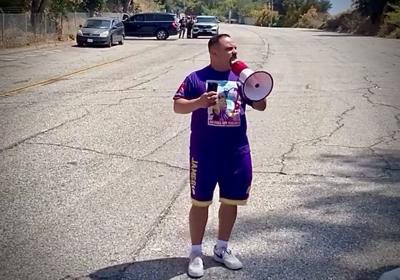
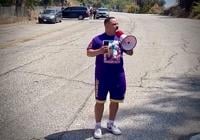

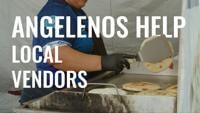

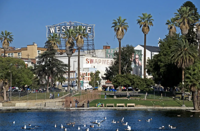

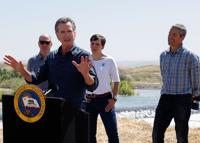


(0) comments
Welcome to the discussion.
Log In
Keep it Clean. Please avoid obscene, vulgar, lewd, racist or sexually-oriented language.
PLEASE TURN OFF YOUR CAPS LOCK.
Don't Threaten. Threats of harming another person will not be tolerated.
Be Truthful. Don't knowingly lie about anyone or anything.
Be Nice. No racism, sexism or any sort of -ism that is degrading to another person.
Be Proactive. Use the 'Report' link on each comment to let us know of abusive posts.
Share with Us. We'd love to hear eyewitness accounts, the history behind an article.